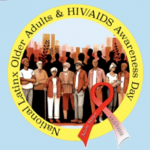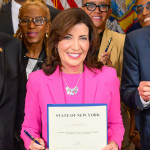Charles Sanchez was born ready for his close-up. He began pursuing an acting career in the 1980s but encountered formidable obstacles—HIV, a coma, comorbidities—while on the road to stardom. Undeterred, the plucky 50-year-old is now enjoying his moment in the spotlight. POZ met up with Sanchez at a diner in Queens, New York (near his apartment), to discuss his HIV-related web series, Merce, and to discover whether his art imitates his life.
Set the scene for us. You were 19 when you left Phoenix for the bright lights of Broadway. What happened next?
I moved to New York to go to the American Musical and Dramatic Academy. I graduated from the school in ’88. I really thought I was going to make it, baby. I had an agent and manager, and I got some work. But mostly, I waited tables and was miserable. But I had a high caliber of rejection.

POZ cover for October/November 2018
Were you openly gay at this time?
One reason to come to New York was to figure out what gay was. I always felt so different from everyone else growing up. We didn’t have the internet—we had Bette Midler and MGM movies. When I started venturing out to nightlife, I was shocked to learn I didn’t fit in there either. Everyone wanted a blond, blue-eyed, straight-acting 22-year-old.
Was HIV on your mind?
It was, but in a weird way. One of my first acting jobs was in an HIV show for kids. I dated guys who had lovers who had died [of AIDS complications]. I didn’t have any friends in ACT UP [the AIDS activist group]. I was in this bubble of going to auditions and waiting tables. I didn’t have my first friend come out to me as HIV positive until, like, ’95.
Tell us about your own HIV diagnosis.
I was in New York for 11 years. I was having a hard time making ends meet, and I remember thinking that it didn’t matter how hard I worked or how good I am—I’m just not the kind to get the role. And it was awful. So I left. I went to LA. I could pretend I was pursuing a career, but mostly I pursued sex, drugs and rock ’n’ roll. I was using crystal meth, and I felt like I had to get out. That was around 2000.
A guy [I had dated] moved to Little Rock, Arkansas, and was saying all the right things to me on the phone, so I took a bus [and moved] to Little Rock. [About three years later,] I was living with a friend. I had what I thought was a stubborn case of bronchitis. She came home from work, and I was on the floor, blue from lack of oxygen. She carried me to her car and drove me to the emergency room. I don’t remember any of this. They intubated me and called my family. I was put in a drug-induced coma for about three weeks, and I was in the hospital for the better part of a month.
Wow. Did anybody know the cause of it?
I found out three weeks later. I had histoplasmosis [a lung infection], PCP [Pneumocystis carinii pneumonia], thrush. My viral load was through the roof; my T-cell count was 4. So “full-blown” AIDS. I had my family around me when the doctor told me, and it freaked me out. My sister grabbed my hand and said, “Don’t worry; we’ve known for three weeks.” A lot freaked me out in those days. I remember the doctor asking me about symptoms, like how long I had night sweats. I said, “How long do you think I’ve been sick?” And he said, “I think you’ve had HIV for a long time.” It was really upsetting that I had been so unaware of my own body.
Then a friend came to visit me, and I was crying and telling him this stuff, and he goes, “Charles, I think you’ve got a really bad attitude. This isn’t the 1980s. Just do what the doctors tell you and take your meds.” And I kinda woke up. Of course, first I had to learn to walk again.

Charles Sanchez and Tyne Firmin in New York City’s Greenwich VillageBill Wadman
What helped you get through the next transition?
My family and friends. They didn’t treat me any differently. I had always worked two or three jobs, and then I was on disability, so that was a big change. I was really depressed. But a dinner theater [where I had been a musical director] helped me get back to work. And people at the Arkansas AIDS Foundation were amazing. I went on a retreat with other people living with HIV, and it was really freeing.
Sometimes, when I hear newly diagnosed stories, a part of me is like, Oh, come on, get over it. But it is traumatic. Your life is going to change. But you have to decide: Am I going to see myself as a sick person or as a person who lives with this thing? I remember thinking, Am I done? Who am I going to be? Well, I’ve got a big mouth. Maybe I can be that guy who is OK. My friends can look at me and go, “My buddy Charles has HIV, and he’s fine.” Maybe I can use my big mouth to be helpful. But you have to decide that.
Is that a decision you have to make over and over?
Yes. Like, how do I make this fun or funny or palatable. Especially as we get older and other things start happening.
What things? You look like you’re in great shape.
I’ve had avascular necrosis. It’s when the blood stops going to the top of the bone and it starts to die. [In my case,] it’s also called flattening of the hip. A lot of people with HIV get it. So I’ve had two hip replacements. First, eight years ago, then two and a half years ago. I’m doing well. Some things I can’t do. I was a runner, and I really miss it. But I do other things. HIV has been a good teacher. I’ve had to learn to bounce.
Backtracking for a minute, you mentioned booze and drugs. Was that a serious problem for you beyond self-medicating?
Yes, I’m an alcoholic. Friday [July 13] was my eight years sober anniversary. Cheers! [We clink our glasses of water.] I didn’t drink at a young age. I was very careful for many years because I was protecting my performance instrument and all that stuff, and then I started feeling like it didn’t really matter, and little by little, unreasonable things became reasonable. I used to think my HIV was caused by my drug use and alcoholism, but I’ve become more forgiving about it all. I got HIV from being a human being doing things humans do.
Did you get sober while in Arkansas?
[Shakes his head no] I figured, I’m not dying; I can move somewhere else and grow. So I came back [to New York] in 2008. I was living in Chelsea [a neighborhood in Manhattan] and knew I needed therapy and support, so I went to GMHC [Gay Men’s Health Crisis], which is like the mother ship of HIV/AIDS services, and I was seeing a wonderful therapist. So he called me on July 4 [2010] and asked me if I was OK, which was weird. And then he said, “Do you remember seeing me last night?”
Oh no. And did you?
I knew I had gone to Rawhide [a local gay bar] and then gotten into a cab. That’s the last thing I remember. When I woke up at home, I had my wallet and phone and keys and glasses, so I thought everything was cool. But I had blacked out. It was scary and awful. When I went to see the therapist, he said, “I found you on Ninth Avenue near 42nd Street, passed out.” And this is the miracle part: He happened to be walking by and saw me, and he knew where I lived because he had visited me after my hip replacement. I think a week later, I went to my first meeting. And I haven’t had a drink since. Or drugs.
How were you managing your HIV through all this?
I’ve been really lucky. Since I started taking meds, I started testing undetectable very quickly—my body always liked drugs! That’s one of the cool things about “U=U” [“Undetectable = Untransmittable,” the concept that people with an undetectable viral load cannot transmit the virus sexually]. It was like, Wow, I’ve been undetectable this whole time and no one has gotten HIV from me. That’s a cool thing to learn.
What have you been doing professionally while in New York?
I worked at a nonprofit school for eight years. I was their social media guy, and I wrote newsletters and stuff. I’ve always written, out of necessity, like plays for kids I was teaching. I’m now a contributing editor at [the HIV-related website] TheBody.com. [Several years ago, I took a class] about writing your own comedy show. Then I wrote campy little stories and monologues and asked my friend Tyne Firmin—we used to work in catering together, like, 30 years ago—I asked him to film them on a flip cam, no budget, and they became Manhattan Man-Travels [a brief YouTube series]. He edited it himself. Then I thought, Let’s really produce and budget and fundraise. We made a script and a new character—Merce—and got a new composer and made it a musical and put HIV at the forefront. It’s not sad, and it’s not depressing. The whole point was to show that his life is crazy and fun.
“Poopsie-Daisy” - Merce and the Fairies from MerceTheSeries on Vimeo
You guys have filmed season 2 and are editing it now [for details, see "Get Your Merce On!" below]. You’ve been posting sneak peeks, including a new episode titled “Under Pressure.” What’s the story behind that?
I came up with the phrase “poopsie-daisy” when on my first medications—Kaletra and Combivir—because I never knew when I was going to have to go. Now I’m on Triumeq and don’t have those issues. Last year, at the annual USCA [United States Conference on AIDS], I went to a meeting where people were talking about HIV-related diarrhea and how big a deal it is and no one talks about it. I met people at Napo Pharmaceuticals and found out about their drug Mytesi [which helps folks cope with this condition]. They asked whether Merce could create a mini episode to use as a teaching tool, and I was like, Sure! I knew exactly what the episode was going to be. That was my real-life experience.
Let’s circle back to your family. October 15 marks National Latinx AIDS Awareness Day. How closely do you relate to that culture, and how much has it affected your HIV journey?
I’m between two worlds. I’m not Latin enough, but we went to church every Sunday. Catholic. Lots of aunts and uncles. I’m the youngest of four—the pink sheep of the family. I’m fifth generation. My parents didn’t teach us Spanish. I’m American. But I also have a z at the end of my name, and I’m Mexican American, and there’s a lot of that in the news these days—“those people”—and I encounter racism. I identify a lot with brown people, and I understand the barriers that come with HIV: machismo and [religion] and stuff. I had a lot of guilt and shame when I was younger. I didn’t come out to my parents until I was 30. They said to me, “We love you. You’re just going to have to give us some time; we’ve lived a long time with certain beliefs.” My family is incredibly loving. My brother and sister have softened a lot. My oldest brother had to—because of me and his oldest son.
You have a gay nephew?
Yes! And he’s smarter than I ever was, so together. But it’s a different time now. [My generation] didn’t have the internet or Will & Grace.
Or Merce.
You know, when Trump was elected, I thought, Now Merce is important. To get a character out there who is really gay and HIV positive—that’s important.
Your Cure (Company) from MerceTheSeries on Vimeo
Get Your Merce On: Details on Season 2
The campy, colorful web series Merce first danced off our screens and into our hearts in 2015. Coproduced by Charles Sanchez (who stars as Merce and writes the episodes) and Tyne Firmin (who costars, in drag, as Mama and directs the show), the musical series follows the “sparkly, show-tuney, jazz-handy middle-aged” Merce, explains Sanchez. “In season 1, I really wanted to show a character living with HIV who wasn’t sad, sick or dying. Merce is looking for love and self-acceptance, just like everyone else. And no one in his circle of family and friends treats him differently because of his HIV. That was an important thing.” You can watch complete episodes of that season as well as musical numbers on MerceTheSeries.com, YouTube and Vimeo.
Season 2 has been filmed and is in postproduction. (If you’d like to help speed up the process, then make a tax-deductible donation via MerceTheSeries.com; the series is a sponsored project of Fractured Atlas, a nonprofit arts service organization.)
What can we expect in season 2? “I’m tackling more issues,” Sanchez says, coyly dodging specific plot details. He divulges that POZ contributing writer and blogger Mark S. King costars as Merce’s Aunt Bless—“who wears her Bible belt pretty tightly”—and that we’ll be treated to “eye-candy bodybuilders, strong female characters and varied races, sexual orientations and ages—because the show takes place in New York City.” Plus, look for cameos by other HIV luminaries, such as POZ blogger Shawn Decker and PrEP advocate Damon Jacobs. (A photo below offers us a glimpse of Firmin as Mama and King as Aunt Bless.)
Firmin tantalizes us with this real-life detail about his working relationship with Sanchez: “Charles is HIV positive, and I am HIV negative. It’s really a perfect match for this show. Come to think of it, we have a serodiscordant relationship—just like [in an upcoming story line of] Merce—only without the fabulous sex that Merce has!”

A scence from season 2 of “Merce”

“Poopsie-Daisy”, a musical number from season 2 of “Merce”

A scence from season 2 of “Merce”

A scence from season 2 of “Merce”

A scence from season 2 of “Merce”







Comments
Comments